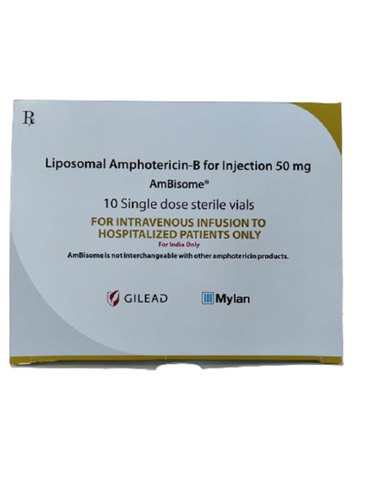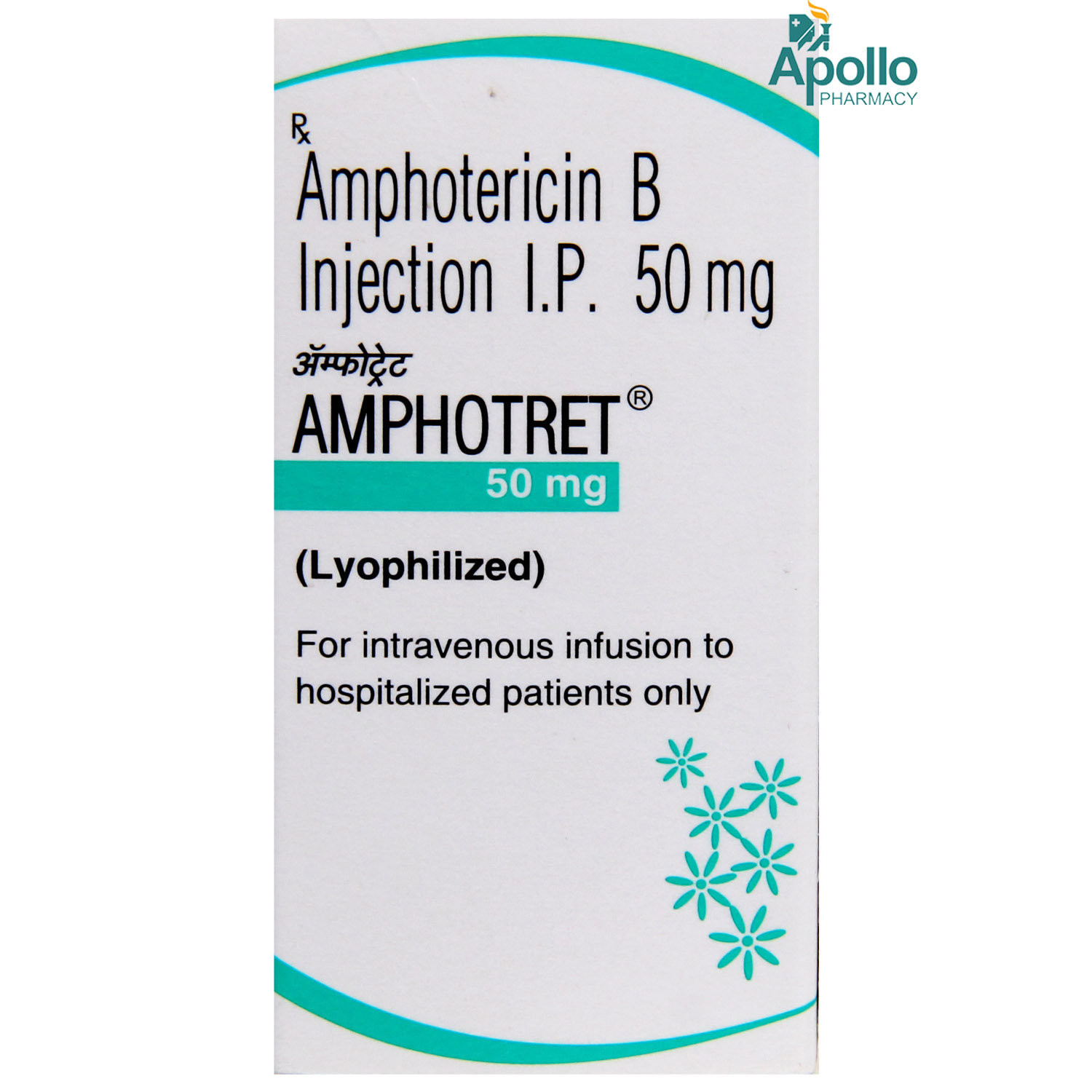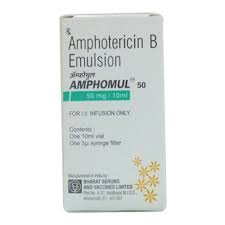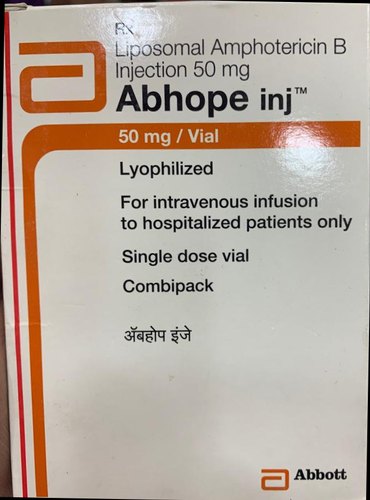Ambisome Injection 1's
MRP ₹6980
(Inclusive of all Taxes)
₹837.6 Cashback (12%)
Provide Delivery Location
Online payment accepted
 Prescription drug
Prescription drugWhats That
Composition :
Manufacturer/Marketer :
Consume Type :
Expires on or after :
Return Policy :
About Ambisome Injection
Ambisome Injection belongs to a class of medication called 'antifungal' used to treat severe fungal infections like leishmaniasis. A fungal infection is a disease in which fungi attack the tissue and cause infection. Fungi are commonly present in nature but do not cause infections normally. However, if the person has a weak immune system, certain types of fungi may infect them.
Ambisome Injection contains Amphotericin B, which kills fungi by destroying the fungal outer cell membrane. The fungal cell membranes are essential for their survival as they prevent the entry of unwanted substances into the cells and stop the leakage of cell contents.
Ambisome Injection is given by a doctor or nurse. In some cases, you may experience fever, chills, irregular heartbeat, high or low blood pressure, breathing problems, nausea, vomiting, headache, shaking, muscle cramps or pain. Most of these side effects of Ambisome Injection do not require medical attention and gradually resolve over time. However, if the side effects persist or worsen, please consult your doctor.
If you are allergic to Ambisome Injection or any other medicines, please tell your doctor. If you are pregnant or breastfeeding, it is advised to inform your doctor before using Ambisome Injection. Ambisome Injection is not recommended for children below one month as the safety and effectiveness were not established. Avoid driving after taking Ambisome Injection as it may affect your ability to drive. If you experience severe adverse effects such as chest pain or difficulty in breathing, or encephalopathy (a brain disease which may cause you to behave strangely, be confused or feel drowsy), seek immediate medical help.
Uses of Ambisome Injection
Directions for Use
Key Benefits
Ambisome Injection contains Amphotericin B, an antifungal used to treat severe fungal infections. The fungal cell membranes are essential for their survival as they prevent the entry of unwanted substances into the cells and stop the leakage of cell contents. Ambisome Injection damages fungal cell membranes and kills fungi. Ambisome Injection is used to treat infections such as blood infection with candida, cryptococcus, fusarium, zygomycetes, aspergillus, coccidiodes or blastomycetes, or cryptococcal meningitis (inflammation of the brain).
Storage
- Talk to your doctor about oral potassium supplements.
- Eat potassium rich foods such as bananas, avocados, oranges, dark leafy greens, beans and peas, fish, spinach, milk and tomatoes.
- Rest well; get enough sleep.
- Wear comfortable layers of clothes and get to a warm place.
- Drink warm fluids like coffee, tea or hot chocolate.
- Warm up using a blanket or heating pad.
- Tell your doctor immediately if you experience shortness of breath after taking medication.
- Your doctor may adjust the medication regimen or dosage or give alternative medical procedures to minimize the symptoms of shortness of breath.
- Monitor your oxygen levels and breathing rate regularly to track changes and potential side effects.
- For controlling stress and anxiety, try relaxation techniques like deep breathing exercises, meditation, or yoga.
- Make lifestyle changes, such as quitting smoking, exercising regularly, and maintaining a healthy weight.
- Seek emergency medical attention if you experience severe shortness of breath, chest pain, or difficulty speaking.
- Follow up regularly with your doctor to monitor progress, adjust treatment plans, and address any concerns or questions.
- Prefer liquid food like juices and soups when you are not likely to eat.
- Avoid spicy, fatty and fried foods as they cause stomach upset.
- Eat small and frequent meals, avoiding large meals at a time.
- Add healthy foods in your diet like fruits and vegetables.
- Take starchy food like cereals, bread and potatoes etc.
- Inform your doctor about the nausea and discuss possible alternatives to the medication or adjustments to the dosage.
- Divide your daily food intake into smaller, more frequent meals to reduce nausea.
- Opt for bland, easily digestible foods like crackers, toast, plain rice, bananas, and applesauce.
- Avoid certain foods that can trigger nausea, such as fatty, greasy, spicy, and smelly foods.
- Drink plenty of fluids, such as water, clear broth, or electrolyte-rich beverages like coconut water or sports drinks.
- Use ginger (tea, ale, or candies) to help relieve nausea.
- Get adequate rest and also avoid strenuous activities that can worsen nausea.
- Talk to your doctor about taking anti-nausea medication if your nausea is severe.
- Record when your nausea occurs, what triggers it, and what provides relief to help you identify patterns and manage your symptoms more effectively.
- Preventing Vomiting (Before it Happens)
- Take medication exactly as prescribed by your doctor. This can help minimize side effects, including vomiting.
- Having a small meal before taking your medication can help reduce nausea and vomiting.
- Talk to your doctor about taking anti-nausea medication along with your prescribed medication.
- Managing Vomiting (If it Happens)
- Try taking ginger in the form of tea, ale, or candy to help alleviate nausea and vomiting.
- What to Do if Vomiting Persists
- Consult your doctor if vomiting continues or worsens, consult the doctor for guidance on adjusting your medication or additional treatment.
Drug Warnings
If you are allergic to Amphotericin B or any other medicines, please tell your doctor. If you are pregnant or breastfeeding, it is advised to consult a doctor before using Ambisome Injection. Ambisome Injection is not recommended for children below one month as the safety and effectiveness were not established. Avoid driving after taking Ambisome Injection as it may affect your ability to drive. If you experience severe adverse effects such as chest pain, difficulty breathing, or encephalopathy (a brain disease that may cause you to behave strangely, be confused or feel drowsy), seek immediate medical help. If you have diabetes, electrolyte imbalance (low magnesium or potassium levels in the blood), kidney, liver or heart problems, inform your doctor before taking Ambisome Injection.
Drug-Drug Interactions
Drug-Drug Interactions
Login/Sign Up
Taking Ambisome Injection and streptozocin together can enhance kidney injury and can cause damage to the ear.
How to manage the interaction:
Taking Streptozocin with Ambisome Injection is not recommended as it can result in an interaction, it can be taken if a doctor has advised it.
Taking cidofovir with Ambisome Injection can increase the risk of kidney problems.
How to manage the interaction:
Although taking Ambisome Injection and cidofovir together can cause an interaction, it can be taken if a doctor has suggested it. However, if you experience nausea, vomiting, loss of appetite, increased or decreased urination, sudden weight gain or weight loss, swelling, shortness of breath, bone pain, muscle cramps, tiredness, weakness, dizziness, confusion, and irregular heart rhythm, contact a doctor immediately. Do not discontinue any medications without consulting a doctor.
Combining Ambisome Injection with Adefovir dipivoxil can increase the risk of kidney damage.
How to manage the interaction:
Although taking Ambisome Injection and Adefovir dipivoxil together can cause an interaction, it can be taken if a doctor has suggested it. However, if you experience nausea, vomiting, loss of appetite, increased or decreased urination, sudden weight gain or loss, fluid retention, swelling, shortness of breath, bone pain, muscle cramps, tiredness, weakness, dizziness, confusion, or irregular heart rhythm, seek immediate medical attention. Do not stop using any medications without talking to a doctor.
Coadministration of Aciclovir with Ambisome Injection can increase the risk or severity of kidney disorder.
How to manage the interaction:
Taking Aciclovir with Ambisome Injection together can result in an interaction, it can be taken if a doctor has advised it. Consult a doctor if you experience irregular urination, muscle ache, shortness if breath, or palpitations. Do not discontinue any medications without consulting a doctor.
Coadministration of Ambisome Injection and Iomeprol may increase the risk of kidney problems.
How to manage the interaction:
Co-administration of Ambisome Injection with Iomeprol can result in an interaction, but it can be taken if a doctor has advised it. It's important to keep an eye on how much you pee. If you experience any changes, like peeing more or less than usual, nausea, vomiting, loss of appetite, increased or decreased urination, sudden weight gain or weight loss, fluid retention, swelling, shortness of breath, muscle cramps, tiredness, weakness, dizziness, confusion, and irregular heart rhythm let the doctor know right away. Do not stop using any medications without talking to a doctor.
Using foscarnet together with Ambisome Injection can cause serious side effects to the kidneys. Using these drugs together can also increase the risks of seizures (fits) and an irregular heart rhythm.
How to manage the interaction:
There may be a possibility of interaction between Ambisome Injection and Foscarnet, but it can be taken if prescribed by a doctor. If you have any of these symptoms, it's important to contact a doctor right away: seizures, an irregular heart rhythm, feeling sick, swelling, sudden weight gain or loss, severe pain in your upper stomach that spreads, strong heartbeats, feeling dizzy, or chest pain. Do not discontinue any medications without consulting a doctor.
Using droperidol together with Ambisome Injection can increase the risk of an irregular heart rhythm.
How to manage the interaction:
Although taking Ambisome Injection and Droperidol together can cause an interaction, it can be taken if a doctor has suggested it. If you notice any of these symptoms - an irregular heart rhythm, a heart condition, a condition called congenital long qt syndrome, problems with your heart's conduction, severe or long-lasting diarrhea, vomiting, complications, sudden dizziness, feeling lightheaded, fainting, difficulty breathing, heart palpitations, feeling weak, feeling sleepy, feeling confused, muscle pain, feeling nauseous or vomiting - make sure to call a doctor right away. Do not discontinue any medications without consulting a doctor.
Coadministration of Ambisome Injection and Iohexol may increase the risk of kidney problems.
How to manage the interaction:
Although taking Ambisome Injection and Iohexol together can cause an interaction, it can be taken if a doctor has suggested it. It's important to keep an eye on how much you pee. If you notice any changes, like peeing more or less than usual, nausea, vomiting, loss of appetite, increased or decreased urination, sudden weight gain or weight loss, fluid retention, swelling, shortness of breath, muscle cramps, tiredness, weakness, dizziness, confusion, and irregular heart rhythm let the doctor know right away. Do not discontinue any medications without consulting a doctor.
Pimozide used with Ambisome Injection may raise the chance of a significantly abnormal heart rhythm, although it is a rare side effect.
How to manage the interaction:
Although taking Ambisome Injection and Pimozide together can cause an interaction, it can be taken if a doctor has suggested it. However, if you experience sudden dizziness, lightheadedness, fainting, breathing difficulty, or rapid heartbeat, weakness, tiredness, drowsiness, confusion, muscle pain, cramps, dizziness, nausea, or vomiting, consult the doctor immediately. Do not stop using any medications without talking to a doctor.
Coadministration of Ambisome Injection and Everolimus can increase the risk of kidney problems.
How to manage the interaction:
Taking Ambisome Injection with Everolimus together can result in an interaction, but it can be taken if a doctor has advised it. However, consult a doctor if you experience nausea, vomiting, loss of appetite, increased or decreased urination, sudden weight gain or loss, fluid retention, swelling, shortness of breath, muscle cramps, tiredness, weakness, dizziness, confusion, or irregular heart rhythm. Do not discontinue any medications without a doctor's advice.
Drug-Food Interactions
Drug-Food Interactions
Login/Sign Up
Diet & Lifestyle Advise
- Wash your hands regularly and keep your hands clean to prevent the spread of germs.
- Avoid dusty activities and digging in the soil.
- Wear shoes, a long-sleeved t-shirt and long pants while doing outdoor activities such as yard work, gardening or visiting wooded areas to protect from fungus commonly present in the environment.
- Maintain a diet that is low in sugar, refined carbohydrates, mould-containing foods and yeast.
Side Effects of Ambisome Injection
- Fever
- Chills
- Irregular heartbeat
- High or low blood pressure
- Breathing problems
- Nausea
- Vomiting
- Headache
- Shaking
- Muscle cramps or pain
Habit Forming
Therapeutic Class
All Substitutes & Brand Comparisons
RX
Out of StockAmpholip 50 Injection 10 ml
Bharat Serums and Vaccines Ltd
₹1982
(₹162.52/ 1ml)
97% CHEAPERRX
Amfocare 50 mg Injection 1's
Win Medicare Ltd
₹227
(₹204.3 per unit)
96% CHEAPERRX
AMPHOTIN 50MG INJECTION
United Biotech Pvt Ltd
₹238
(₹214.2 per unit)
96% CHEAPER
Author Details
We provide you with authentic, trustworthy and relevant information
Drug-Diseases Interactions
Drug-Diseases Interactions
Login/Sign Up
FAQs
Drug-Drug Interactions Checker List
- ZIDOVUDINE
- CICLOSPORIN
- FLUCYTOSINE
- FUROSEMIDE
- METHOTREXATE
Special Advise
- Regular blood tests are recommended while taking Ambisome Injection to monitor blood, liver or kidney functioning and potassium levels.
Disease/Condition Glossary
Fungal infection is a disease in which fungi attack the tissue and cause infection. Fungi are commonly present in nature but do not cause infections normally. However, if the person has a weak immune system, certain types of fungi may infect them. Cryptococcal meningitis is a fungal infection of tissues covering the spinal cord (meninges) and brain. The symptoms include headache, hallucinations, fever, stiff neck, sensitivity to light, nausea and vomiting. Fungal infections in the lungs may be more serious and life-threatening and often cause symptoms similar to tuberculosis or bacterial pneumonia.

Have a query?
Alcohol
Safe if prescribed
The interaction of Ambisome Injection with alcohol is unknown. Please consult your doctor if you have any concerns regarding this.
Pregnancy
Consult your doctor
Ambisome Injection is a Category B pregnancy drug and is given to a pregnant woman if the doctor thinks the benefits outweigh the risks. Please consult your doctor if you are pregnant or planning pregnancy.
Breast Feeding
Consult your doctor
It is unknown whether Ambisome Injection is excreted in human milk. If you are breastfeeding, inform your doctor before receiving this injection.
Driving
Safe if prescribed
Avoid driving after taking Ambisome Injection as it may affect your ability to drive or operate machinery.
Liver
Consult your doctor
Inform your doctor if you have a history of liver diseases/conditions before receiving Ambisome Injection.
Kidney
Consult your doctor
Inform your doctor if you have a history of kidney diseases/conditions before receiving Ambisome Injection.
Children
Safe if prescribed
Ambisome Injection is not recommended for children below one month as the safety and effectiveness were not established.














